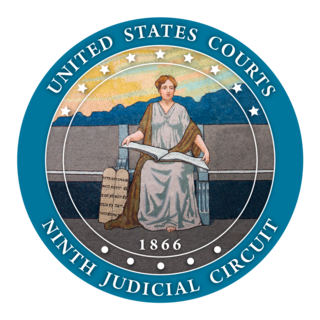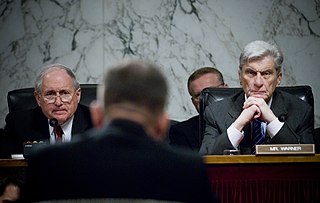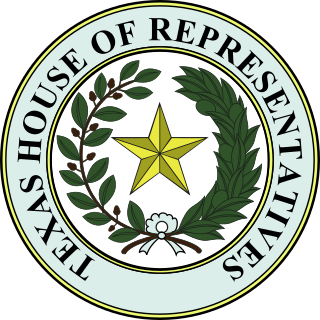
The federal government of the United States is the national government of the United States, a federal republic located primarily in North America, composed of 50 states, five major self-governing territories, several island possessions, and the federal district and national capital of Washington, D.C., where most of the federal government is based.

The United States Court of Appeals for the Ninth Circuit is the U.S. federal court of appeals that has appellate jurisdiction over the U.S. district courts in the following federal judicial districts:

A congressional committee is a legislative sub-organization in the United States Congress that handles a specific duty. Committee membership enables members to develop specialized knowledge of the matters under their jurisdiction. As "little legislatures", the committees monitor ongoing governmental operations, identify issues suitable for legislative review, gather and evaluate information, and recommend courses of action to their parent body. Woodrow Wilson once wrote, "it is not far from the truth to say that Congress in session is Congress on public exhibition, whilst Congress in its committee rooms is Congress at work." It is not expected that a member of Congress be an expert on all matters and subject areas that come before Congress. Congressional committees provide valuable informational services to Congress by investigating and reporting about specialized subjects.

The Texas House of Representatives is the lower house of the bicameral Texas Legislature. It consists of 150 members who are elected from single-member districts for two-year terms. There are no term limits. The House meets at the State Capitol in Austin.

The U.S. House Committee on the Judiciary, also called the House Judiciary Committee, is a standing committee of the United States House of Representatives. It is charged with overseeing the administration of justice within the federal courts, federal administrative agencies, and federal law enforcement entities. The Judiciary Committee is often involved in the impeachment process against federal officials. Because of the legal nature of its oversight, committee members usually have a legal background, but this is not required.

The United States Senate Committee on the Judiciary, informally known as the Senate Judiciary Committee, is a standing committee of 21 U.S. senators whose role is to oversee the Department of Justice (DOJ), consider executive and judicial nominations, and review pending legislation.
U.S. Senate Appropriations Subcommittee on Financial Services and General Government is one of twelve subcommittees of the U.S. Senate Committee on Appropriations. It was renamed from the Subcommittee on District of Columbia in 2007 in order to align the operations of the House and Senate Appropriations Committees. The United States Senate Committee on Appropriations has joint jurisdiction with the United States House Committee on Appropriations over all appropriations bills in the United States Congress. Each committee has 12 matching subcommittees, each of which is tasked with working on one of the twelve annual regular appropriations bills. This subcommittee has jurisdiction over the budget for the United States Department of the Treasury and General Government.

The Marriage Protection Act of 2004 (MPA) was a bill introduced in the United States Congress in 2003 to amend the federal judicial code to deny federal courts jurisdiction to hear or decide any question pertaining to the interpretation of the Defense of Marriage Act (DOMA) or the MPA itself. Introduced as H.R. 3313 during the 108th Congress, the Republican-controlled House passed it in 2004, but it did not pass the Senate.
The Human Life Amendment is the name of multiple proposals to amend the United States Constitution that would have the effect of overturning the Supreme Court 1973 decision Roe v. Wade, which ruled that prohibitions against abortion were unconstitutional. All of these amendment proposals seek to overturn Roe v. Wade, but most of them go further by forbidding both Congress and the states from legalizing abortion. Some of the proposals define human life as beginning with conception or fertilization.
The United States Senate Judiciary Subcommittee on Competition Policy, Antitrust and Consumer Rights is one of eight subcommittees within the Senate Judiciary Committee. It was previously known as the Subcommittee on Antitrust, Competition Policy and Consumer Rights. The Subcommittee's counterpart in the House of Representatives is the House Judiciary Subcommittee on Antitrust, Commercial and Administrative Law.
The Senate Judiciary Subcommittee on Intellectual Property is one of Eight subcommittees within the Senate Judiciary Committee. The subcommittee was disbanded in 2007, but reinstated in 2019 at the beginning of the 116th Congress.
The United States Senate Judiciary Subcommittee on Terrorism and Homeland Security is one of six subcommittees within the Senate Judiciary Committee.

The Federal Judicial Center is the education and research agency of the United States federal courts. It was established by Pub. L.Tooltip Public Law 90–219 in 1967, at the recommendation of the Judicial Conference of the United States.
The Subcommittee on Commercial and Administrative Law (CAL) is a former subcommittees of the United States House Committee on the Judiciary. It was incorporated into the Subcommittee on Courts, Commercial and Administrative Law during the 112th Congress.
United States House Judiciary Subcommittee on the Administrative State, Regulatory Reform, and Antitrust is a subcommittee within the House Committee on the Judiciary. The Subcommittee's equivalent in the Senate is the Senate Judiciary Subcommittee on Competition Policy, Antitrust and Consumer Rights. It was previously known as the Subcommittee on Antitrust, Commercial and Administrative Law.
The Senate Judiciary Subcommittee on Immigration, Citizenship and Border Safety was one of six subcommittees within the Senate Judiciary Committee during the 114th Congress. The judiciary subcommittee on immigration is called the Subcommittee on Border Security and Immigration for the 116th Congress and was called Immigration, Refugees, and Border Security during the 113th Congress.
Mark Stephen Scarberry is professor of law at Pepperdine University School of Law. Much of his research and teaching focuses on bankruptcy and constitutional law. Scarberry is "a self-described evangelical Protestant."
The House Judiciary Subcommittee on Courts, Intellectual Property and the Internet is a subcommittee within the House Judiciary Committee. It was established in 2011.
The Senate Judiciary Subcommittee on Federal Courts, Oversight, Agency Action and Federal Rights is one of seven subcommittees within the United States Senate Committee on the Judiciary. It was created at the beginning of the 113th Congress. It was previously known as the Subcommittee on Oversight, Agency Action, Federal Rights and Federal Courts







